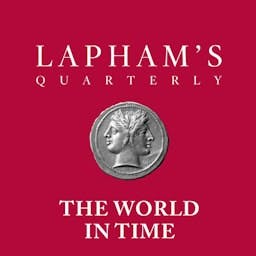

The World in Time / Lapham’s Quarterly
Lapham’s Quarterly
Donovan Hohn, the acting editor of Lapham's Quarterly, interviews historians, writers, and journalists about books that bring voices from the past up to the microphone of the present. New episodes are released weekly.
Episodes
Mentioned books

Feb 18, 2022 • 33min
Episode 84: Andrew J. O’Shaughnessy
Historian Andrew J. O’Shaughnessy, author of 'The Illimitable Freedom of the Human Mind,' dives into Thomas Jefferson's profound yet complicated legacy. He explores Jefferson's unwavering commitment to founding the University of Virginia, revealing how it reflects his ideals about education and freedom. The conversation tackles the duality of Jefferson's legacy as both a champion of democracy and a slave owner. O’Shaughnessy also emphasizes the urgent need for education as a tool to rectify historical injustices, blending past and contemporary discussions about liberty.

Feb 4, 2022 • 38min
Episode 83: Joseph J. Ellis
Joseph J. Ellis, a Pulitzer Prize-winning historian renowned for his work on early American history, discusses the paradoxical nature of the American Revolution. He argues that its success stemmed from not being a true revolution, highlighting the complexity of founders' choices, including those surrounding slavery. The conversation delves into George III's role in catalyzing independence, the resilience shown at Valley Forge, and the ideological currents shaping revolutionary thought, all while drawing striking parallels to modern political challenges.

Dec 22, 2021 • 40min
Episode 82: David Wengrow
David Wengrow, an archaeologist renowned for his work on social evolution and co-author of *The Dawn of Everything*, dives deep into the complexities of human history. He challenges the idea that societal advancements emerged solely from agriculture, uncovering diverse ancient cultures with egalitarian principles. The discussion highlights Indigenous perspectives, critiques of social hierarchies, and creative alternatives to capitalism in the face of ecological challenges. Wengrow emphasizes that human history is rich with possibilities, urging a rethinking of our collective past and future.

Dec 3, 2021 • 41min
Episode 81: Geoffrey Wheatcroft
Geoffrey Wheatcroft, a historian and author known for his insights on Winston Churchill, dives deep into the myths surrounding Churchill's legacy. He discusses why many view Churchill as a fictional character, illustrating how popular culture distorts historical facts. The conversation critiques Churchill's military decisions, particularly during the Gallipoli Campaign and WWII, while also highlighting the duality of his celebrated yet controversial nature. Wheatcroft connects Churchill's actions to contemporary issues, urging a reexamination of his historical impact.

Nov 12, 2021 • 45min
Episode 80: Nicholas Crane
In this insightful discussion, writer and explorer Nicholas Crane shares his journey through history as he recounts the 1735 expedition aimed at measuring the Earth's curvature. He emphasizes the early alliances in scientific collaboration that laid the groundwork for modern challenges like the COVID-19 pandemic and climate change. Crane navigates the arduous journey through the Andes, facing altitude sickness and wildlife threats, while highlighting the unsung contributions of local guides and the complexities of the expedition's dynamics.

Oct 15, 2021 • 51min
Episode 79: Charles Foster
In this engaging discussion, veterinarian, philosopher, and legal scholar Charles Foster shares insights from his book, delving into our ancient human roots and the evolution of consciousness. He recounts his experiences attempting to live like Upper Paleolithic humans, highlighting the stark contrasts with modern life. Foster also explores the interplay of mind and matter, revealing how our brains might function as prisms of consciousness. He critiques modern science's neglect of intuition, advocating for a blend of skepticism and creativity to navigate contemporary challenges.

4 snips
Oct 1, 2021 • 34min
Episode 78: Michael Knox Beran
Lewis Lapham interviews Michael Knox Beran, author of 'WASPS: The Splendors and Miseries of an American Aristocracy.' They discuss the history, influence, and predicted obsolescence of the WASPs. The chapter also explores the portrayal of high wasps in literature and the role of T.S. Eliot in cultural reform.

Sep 17, 2021 • 38min
Episode 77: Philip Hoare
Philip Hoare, acclaimed author known for exploring art and the natural world, dives into the genius of Albrecht Dürer. They discuss Dürer’s artistic legacy and his brilliance in capturing humanity and nature. Hoare reveals the fascinating story behind Dürer’s iconic rhinoceros woodcut. The conversation also touches on Dürer’s innovative techniques, including his unique pigments, and the emotional depth in his dog imagery, showcasing the artist's childlike charm. Prepare for an insightful journey through art history and identity!

Sep 3, 2021 • 51min
Episode 76: Eric Berkowitz
“The compulsion to silence others is as old as the urge to speak,” historian Eric Berkowitz writes in Dangerous Ideas: A Brief History of Censorship in the West, from the Ancients to Fake News, “because speech—words, images, expression itself—exerts power…Even in countries where free expression is cherished, we often forget that forgoing censorship requires the embrace of discord as a fair price for the general good. Tolerance is risky. Suppression, on the other hand, is logical—and across history, it has been the norm.”
In this episode of The World in Time, Lewis H. Lapham and Berkowitz discuss this history and consider the future of censorship and free speech.
Lewis H. Lapham speaks with Eric Berkowitz, author of “Dangerous Ideas: A Brief History of Censorship in the West, from the Ancients to Fake News.”
Thanks to our generous donors. Lead support for this podcast has been provided by Elizabeth “Lisette” Prince. Additional support was provided by James J. “Jimmy” Coleman Jr.

Aug 20, 2021 • 49min
Episode 75: Simon Winchester
Lewis H. Lapham speaks with Simon Winchester, author of “Land: How the Hunger for Ownership Shaped the Modern World.”
Thanks to our generous donors. Lead support for this podcast has been provided by Elizabeth “Lisette” Prince. Additional support was provided by James J. “Jimmy” Coleman Jr.


